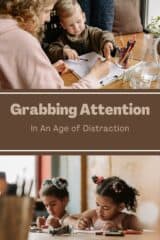Grabbing Attention In An Age of Distraction
 In our media-saturated world, it’s becoming increasingly difficult to hold the attention of our kids long enough to impart knowledge to them, whether at church or school. Video games, sound bites, flash-ads, and 30-second commercials have worked together to shorten the expected attention span of children and adults, too! This isn’t news to those who have been teaching for a while. How can we get better at grabbing attention in an age of distraction? Here are some thoughts that might be helpful…
In our media-saturated world, it’s becoming increasingly difficult to hold the attention of our kids long enough to impart knowledge to them, whether at church or school. Video games, sound bites, flash-ads, and 30-second commercials have worked together to shorten the expected attention span of children and adults, too! This isn’t news to those who have been teaching for a while. How can we get better at grabbing attention in an age of distraction? Here are some thoughts that might be helpful…
It’s Not Brain Surgery, But…
In a recently re-aired broadcast of Focus On The Family entitled Protecting Your Family From the Digital Invasion, Drs. Archibald Hart and Sylvia Hart Frejd discussed the impact of digital media on the brain. In short, the brain contains both gray and white cells. The gray are better at storing data, while the white are more rapid but not good at retention. The purpose of white cells are to speed processing in instances that require quick reaction time, such as those found in video games. Gray cells are there to enhance cognitive thought and memory.
Our brains are very adaptable, and cells in the brain will change function as need arises. The bad news is that the more our brains are exposed to video games, fast-flash media, and sound bites, the more our brain cells convert to white. This results in shorter attention spans, and less cognitive ability. In fact, research suggests that inordinate involvement in action video games can increase the chance of developing dementia. In South Korea there have been reported cases of early onset dementia, caused by overuse of digital media.
The Solution Begins at Home…
The good news is that since the brain is so adaptable, the damage can be reversed. The first line of defense is parents, who must regulate time spent on video games, internet activity and smart phone apps that require quick response rather than cognitive thought. A recommended amount would be less than three hours a day. Other sources say less than two. Getting the family unplugged and involved in a balance of activities that don’t involve electricity is a positive move. In our home, we limit consecutive time to 30 minutes, and two hours plugged in per day. On Sunday, we have an electronics ‘fast’ until after evening service. And once a quarter or so we declare a ‘no electronics week’, during which we don’t plug in except for one family movie night. (And texting. And whatever the kids can sneak in.)
…and It continues at Church
The digital age has affected how churches often present the Bible to kids from younger children through youth. Use of YouTube videos, SkitGuys, and VeggieTales (for the younger set) have become almost required to grab the attention of the children. But once you have their attention, it’s important to present God’s eternal Word, and then get them to use their brains to think about what has been presented. And then, certainly for the older set, get them to commit to some form of personal quiet time (unplugged) on a daily basis.
There are so many resources available today to impart God’s Word to the children in our care, but the use of video and digital entertainment in church should not replace a more cognitive, thoughtful engagement with God’s Word. Overuse of digital and video media might even make our short attention spans… well, shorter.



